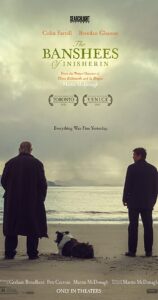The Banshees of Inisherin
Posted on October 19, 2022 at 10:30 am
B +| Lowest Recommended Age: | Adult |
| MPAA Rating: | Rated R for language throughout, some violent content and brief graphic nudity |
| Profanity: | Strong language |
| Alcohol/ Drugs: | Drinking and drunkenness |
| Violence/ Scariness: | Domestic abuse including sexual abuse, suicide, graphic and disturbing self-mutilation, arson |
| Diversity Issues: | None |
| Date Released to Theaters: | October 7, 2022 |
| Date Released to DVD: | December 19, 2022 |

If he thought about it, which he does not, because he does not think about much and takes comfort in not having to think about much, Pádraic would feel comforted by that familiarity and certainty. So, as this movie begins, Pádraic pets Colm’s dog, as usual, then invites him to the pub, as usual, it is deeply disturbing when Colm does not answer and even more disturbing when Colm does come to the pub but will not sit with him. Pádraic offers to apologize for anything he may have done to insult or upset Colm. But Colm shakes him to the core by saying he no longer likes Pádraic or wants to be friends with him.
Colm has been doing some thinking about life and has decided he no longer has time for chit-chat about meaningless topics. He wants to spend all of the time he has left creating something that will live on after he is gone. Pádraic is not able to understand this. he believes that meaningless chit-chat has value because it is kind; perhaps it is all that has value. When he refuses to let Colm alone, Colm makes a terrible promise. He will cut off a finger every time Pádraic tries to speak to him.
Gleason and Farrell, re-teamed with “In Bruges” writer/director McDonogh, give performances of deep complexity and authenticity. We can see them each, in his own way, struggling with his thoughts and emotions they find difficult to explain. Director of Photography Ben Davis places this small story of a small quarrel in the midst of spectacular beauty, with an evocative core from Carter Burwell. The characters occasionally refer casually to the far-distant sounds of gunfire from the battles of the Irish civil war and one mentions the payment and free lunch he will get from providing security at an upcoming hanging, though he does not remember which side the condemned men were on. They may give some thought to existential questions about the meaning of life, but when it comes to the affairs of the world, they seem to have no impact at all. The local shop proprietor insists on being paid in local gossip as well as money, the more lurid the better as long as it does not pertain to someone she cares about. But no one seems connected enough to try to respond to what is going on. Everyone knows that the local policeman constantly abuses his son (a heart-wrenching performance by Barry Keoghan as the damaged man). Other than offering him a night in their home — only one, Siobhan insists, no one intervenes.
There’s a sterility to the community. None of the main characters are married and we see almost no children. Siobhan is the only one who seems connected to the larger world, through a love of books the rest of the community considers mildly odd. And yet, in their own way, each of the characters is trying to find purpose. Neither Pádraic nor Colm is right. Kindness and art are both ways to find meaning. They may be wrong in considering them mutually exclusive. McDonagh pursues these questions here, as he did in “Three Billboards Outside Ebbing, Missouri” and “In Bruges,” with a unique combination of dark humor, shocking violence, and an invitation to the audience that is both heightened and very real.
Parents should know that this movie included graphic and very disturbing self-mutilation, sexual and violent abuse of an adult by his parent, suicide, off-screen (real-life) war violence, strong language, drinking and drunkenness
Family discussion: Who is right about what is important in life, Colm, Pádraic, or Siobhan? Why is the story set during the time of the Irish Civil War? Why are the characters in this story unmarried and childless?
If you like this, try: “In Bruges”
